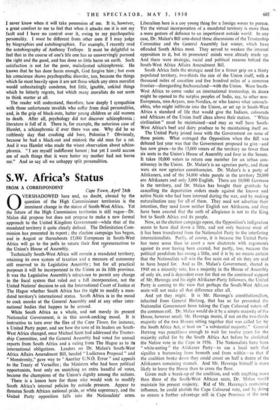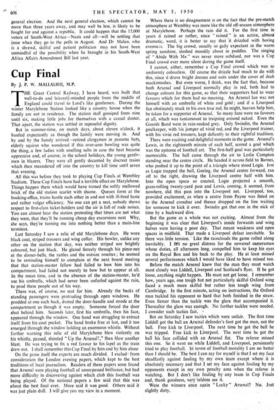S.W. Africa's Status
FROM A CORRESPONDENT Cape Town, April 24th
0 VERSHADOWED here and, no doubt, abroad by the question of the High Commissioner territories is the imminent change in the status of South-West Africa. Yet the future of the High Commission territories is still vague—Dr. Malan did propose but does not propose to make a new formal approach to the United Kingdom Government—while that of the mandated territory it quite clearly defined. The Delimitation Com- mission has presented its report ; the election campaign has begun, and in August or thereabouts 15,000 Europeans in South-West Africa will go to the polls to return their first representatives to the Union's House of Assembly.
Technically South-West Africa will remain .a mandated territory, retaining its own system of taxation and a measure of autonomy still reserved to its Legislative Assembly ; but for all practical purposes it will be incorporated in the Union as its fifth province. It was the Legislative Assembly's reluctance to permit any change in the fiscal system that ruled out a full incorporation, not the United Nations' decision to ask the International Court of Justice at The Hague whether South Africa has the right to modify a man- dated territory's international status. South Africa is in the mood to cock snooks at the General Assembly and at any other inter- national bodies that happen to be around.
White South Africa as a whole, and not merely its present Nationalist Government, is in this snook-cocking mood. It is instructive to turn over the files of the Cape Times, for instance, a United Party paper, and see how the tone of its leaders on South- West Africa changed, once Michael Scott had addressed the Trustee- ship Committee, and the General Assembly had voted for annual reports from South Africa and a ruling from The Hague as to its international obligations. Leaders on Dr. Malan's South-West Africa Affairs Amendment Bill, headed " Ludicrous Proposal " and " Monstrosity," gave way to " Another U.N.O. Error " and appeals to the Treaty of Versailles ; the Ministers who had been political opportunists, bent only on snatching an extra handful of votes, became the champions of the Union's dignity among the nations.
There is a lesson here for those who would wish to modify South Africa's internal policies by outside pressure. Appear to tlueaten South African national pride, or white supremacy, and the United Party opposition falls into the Nationalists' arms. Liberalism here is a coy young thing for a foreign wooer to pursue. Yet the virtual incorporation of a mandated territory is more than a mere gesture of defiance to an impertinent outside world. In any case, Dr. Malan's Bill ante-dated those discussions of the Trusteeship Committee and the General Assembly last winter, which have offended South Africa most. They served to weaken the internal opposition to it, but its promoters' minds were already made up. And there were strategic, racial and political reasons behind the South-West Africa Affairs Amendment Bill.
South Africa feels the strategic need for a firmer grip on a thinly populated territory, two-thirds the size of the Union itself, with thousand miles of coastline and five hundred miles of a common frontier—disregarding Bechuanaland—with the Union. Were South- West Africa to come under an international trusteeship, its doors might be opened to the surplus peoples of India, say, to other non- Europeans, non-Aryans, non-Nordics, or who knows what untouch- ables, who might infiltrate into the Union, or set up in South-West Africa a standard of life that would give the Indians, coloureds and Africans of the Union itself ideas above their station. " White civilisation " must be maintained—and may as well have South- West Africa's beef and dairy produce to be maintaining itself on.
The United Party joined issue with the Government on none of these points. What outraged the Opposition when the Bill was debated last year was that the Government proposed to give—and has now given—to the 15,000 voters of the territory no fewer than six seats in the Union's House of Assembly and four in the Senate. It takes 10,000 voters to return one member for an urban con- stituency in the Union. Dr. Malan's is an agrarian party, and these were six new agrarian constituencies. Dr. Malan's is a party of Afrikaners, and of the 34,000 white people in the territory 20,000 are Afrikaners and only 3,000 English. There are 10,000 Germans in the territory, and Dr. Malan has bought their gratitude by cancelling the deportation orders made against the known and active Nazis who had been interned during the war, and by making naturalisation easy for all of them. They need not advertise their intention, they need know neither English nor Afrikaans, and they have been assured that the oath of allegiance is not to the King, but to South Africa and its people.
Now, as the election campaign opens, the Opposition's indignation seems to have died down a little, and not only because most of it has been transferred from the Nationalist Party to the interfering internationalists. Partly, of course, it is because the United Party has more sense than to court a new electorate with arguments against its ever having been created, but partly, too, because the political pendulum has swung a little, and it is by no means certain that the Nationalists will win the five seats out of six they are said to have hoped for. And as Dr. Malan's Government, elected in 1948 on a minority vote, has a majority in the House of Assembly of only six, and is dependent even for that on the continued support of Mr. Havenga and his eight Afrikaner-Party followers, the United Party is coming to the view that perhaps the South-West African seats-will not make all that difference after all.
And yet they might. It is Mr. Havenga's constitutionalism, inherited from General Hertzog, that has so far prevented the Nationalist Government from taking the Cape Coloured voters off the common roll. Dr. Malan would do it by a simple majority of the House, however small; Mr. Havenga insists, if not on the two-thirds majority of the two Houses sitting together that was called for by the South Africa Act, at least on " a substantial majority." General Hertzog was punctilious enough to wait for twelve years for the majority called for by the South Africa Act before he abolished the Native vote in the Cape in 1936. The Nationalists have been " white-anting " the Afrikaner Party—to use a local verb that signifies a burrowing from beneath and from within—so that if the coalition broke down they could count on half a dozen of the Afrikaners remaining staunch. And Mr. Havenga himself is more likely to leave the House than to cross the floor.
Given such a break-up of the coalition, and with anything more than three of the South-West African seats, Dr. Malan would maintain his present majority. Rid of Mr. Havenga's restraining influence, he could abolish the Cape Coloured vote, and by doing so ensure a further advantage still in Cape Province at the next general election. And the next general election, which cannot be more than three years away, and may well be less, is likely to be • fought for and against a republic. It could happen that the 15,000 voters of South-West Africa—Nazis and all—will be settling that issue when they go to the polls in August. And Dr Malan, who is a shrewd, skilful and patient politician may not have been unmindful of the possibility when he brought in his South-West Africa Affairs Amendment Bill last year.







































 Previous page
Previous page